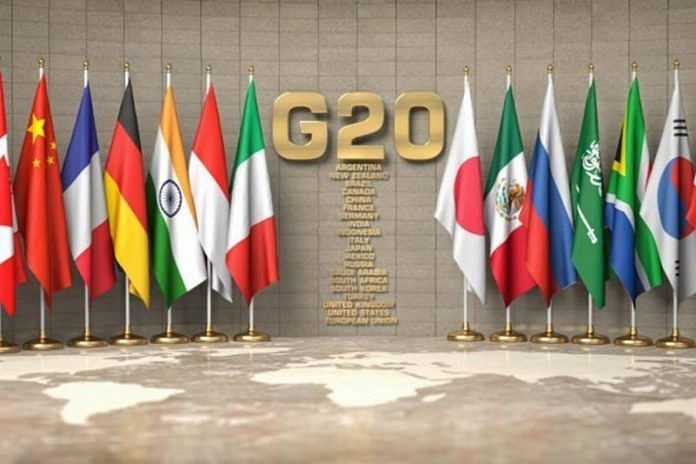New Delhi: With the West and Russia resolute on their stances one year into the Ukraine war, the ability of global forums to find a solution has been brought into question. With this backdrop, “strengthening multilateralism” has been listed as the very first topic on the Ministry of External Affairs’ (MEA) schedule of discussion sessions at the G20 foreign ministers’ meet in New Delhi today.
India, as G20 president, will face the tough task of trying to find some consensus between the West and Russia over the Ukraine conflict, while also ensuring that issues like climate change and debt distress in the developing world are not overshadowed.
Experts have gone as far as to say that the Ukraine war has “polarised” and “eroded” multilateral forums like the United Nations and Group of 20, comprising 19 nations and the European Union.
Last week, a resolution in the UN General Assembly (UNGA) calling for the immediate withdrawal of Russian troops from Ukraine divided many countries, with 141 voting in favour, seven against and 32 abstaining. India was part of the third category.
Many such non-binding resolutions have been tabled at the UNGA since last February, when Russia invaded Ukraine.
Divisions were most evident last April, when 93 countries voted in favour, 24 against, and 58 abstained from a resolution calling to suspend Russia’s membership from the UN Human Rights Council.
The G20 itself showed fractures last year, when Russian Foreign Minister Sergey Lavrov walked out of the G20 foreign ministers’ meeting in Indonesia. Since the G20 works on a consensus basis, no joint communique was issued following the meeting.
The same occurred after Saturday’s G20 finance ministers’ meeting in Bengaluru where India, in its chair summary, noted that Russia and China did not agree to certain sections of the outcome document.
However, some diplomats are confident that India will be able to build a bridge between the two opposing blocs since it enjoys good relations with Russia — one of its major sources of crude oil and military supplies — as well as the US, a strategic ally in the Indo-Pacific.
“India has bridges of trust across different groupings in the world order,” UN resident coordinator Shombi Sharp had told ThePrint in an interview last December.
Also read: What Russia-Ukraine war teaches us — 5 big tactical takeaways for India
‘Ukraine war eroding multilateral forums’
Over the last one year of the Ukraine war, western countries have ramped up military aid to Ukraine, with the US, UK, and Germany now planning to send tanks to its capital Kyiv.
Countries like India continue to make calls for dialogue and diplomacy and have stuck to sending only humanitarian assistance to the war-torn country.
Meanwhile, Russian president Vladimir Putin has said Russia is open to diplomacy but won’t compromise on its security.
Experts agree that the Ukraine war is “eroding” forums like the UN and the G20.
“Positions taken by both the West and Russia are eroding multilateralism. The situation in Ukraine has polarised the G20, the UN and more. Formerly neutral countries like Sweden and Finland now wanting to join the NATO (North Atlantic Treaty Organisation) has added to the polarisation,” former diplomat TCA Raghavan told ThePrint.
He added that peace talks between Russia and Ukraine that took place last year had “failed” and the rest of the world continues to bear the economic consequences of the conflict.
Former Indian ambassador to China, Ashok Kantha, said the Ukraine war had overshadowed other global issues. “The Ukraine issue is sucking the oxygen out of various multilateral forums,” he told ThePrint.
“In public discourse and perception, it is dominating the agenda at G20 and shadowing other issues like the negative impact of the war on developing countries, and the urgency of addressing their debt distress,” added the diplomat.
(Edited by Nida Fatima Siddiqui)
Also read: ‘I’m lost’: Year on, wife of first Ukrainian soldier to die in Russian war seeks answers



